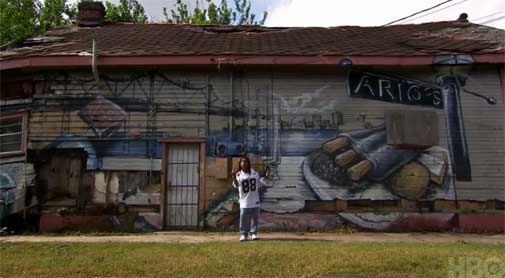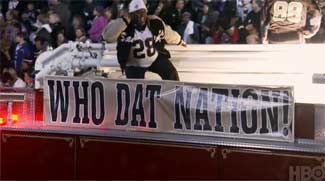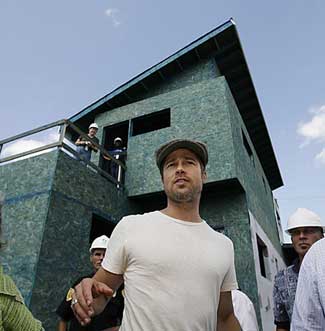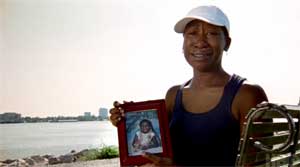
Plainly speaking, New Orleans has never been in very good shape.
Poverty, greed, corruption and an overall laissez-faire "Big Easy" malaise have characterized the city since its sale to the U.S. in 1803 as part of the Louisiana Purchase.
Then came Hurricane Katrina five summers ago. And on April 20th of this year, the British Petroleum (BP) oil rig explosion unleashed its gargantuan spill.
It's all more than enough to make a resident wonder aloud, "Do you want to stay livin' in a place like this?" Spike Lee raises that question early in If God Is Willing and Da Creek Don't Rise, the four-hour sequel to his acclaimed earlier HBO documentary, When the Levees Broke. And he basically revisits it repeatedly during a film that's far stronger in Monday's Part 1 than in Tuesday's second half.
Airing throughout this month and next on HBO, Creek Don't Rise premieres on Aug. 23-24 at 9 p.m. ET each night. It will be among a cavalcade of programming tied to the fifth anniversary of the Katrina devastation.

Those wounds, many still unhealed, were cauterized for a brief time by the New Orleans Saints' historic Feb. 7 Super Bowl win against the Indianapolis Colts. That's where Lee's sequel begins, after a powerful opening manifesto by author Phyllis Montana-LeBlanc (Not Just the Levees Broke) and a montage of the death and destruction dealt by Katrina.
The joyous chorus of "Who Dats?" on Super Bowl Sunday were only allowed to reverberate for two-and-a-half months before the BP Gulf oil spill went unchecked for a seemingly eternal 86 days. Lee thought he had his film in the can, but returned to document the latest catastrophe befalling this still dilapidated city. Or as musician Dr. John puts it at a rally, New Orleans once again "got the shaft."
Monday's first half of Creek Don't Rise excels in both its selection of interview subjects and its dissections of two major post-Katrina developments -- the demolishment of already badly decayed public housing projects and the closing of Charity Hospital. Lee obviously opposes both demises, but does give the other sides a hearing.
Former New Orleans mayor Ray Nagin, for one, believes that in reality only one of the housing projects might have been worth saving, even if their demolitions were accelerated when city officials saw a golden post-Katrina opportunity. Absent their residents, who fled the city, the tear-downs became all that much easier.
Some of the projects since have been replaced by "mixed income" developments that supposedly will mesh poor and well-off residents under essentially the same roof. But some see that as a utopian pipe dream while a neighborhood activist compares some of the new structures to a fashion model who looks good on the outside but is anorexic on the inside.

The smoldering debate over public housing gives way in Monday's Part 1 to the good will generated by actor Brad Pitt's "Make It Right" initiative to build affordable, well-made homes in New Orleans still storm-ravaged Lower Ninth Ward.
Those who see Pitt as the pampered co-star of "Brangelina" (with actress Angelina Jolie) can watch him walk the walk in this instance. Affixed with a scraggly beard and long-ish hair, Pitt says that "we rejected the idea that affordable housing has to use crap materials, toxic materials."
He has enlisted various architects in the "Make It Right" effort, with all of them contributing their designs pro bono. The result to date is more than 50 new homes at an average price of $150,000.
Creek Don't Rise also takes a side trip to Haiti, where actor Sean Penn has taken up residence in Port au Prince while helping the post-earthquake relief effort. Oft-maligned by Fox News Channel's arsenal of conservative personalities, Penn is another actor whose humanitarian efforts should be applauded unreservedly despite what one may think of his politics.
"The earthquake in Haiti (from where thousands of refugees migrated to New Orleans in the early 1800s) makes Katrina look like a delightful garden party," says Jacques Morial, co-director of the Louisiana Justice Institute.

Part One also has a revealing new interview with former FEMA director Michael Brown, of "Brownie, you're doin' a heckuva job" infamy. Brown, now an apparently prosperous consultant, notes how he can be seen wincing when President Bush laid that one on him. He admits to some mistakes in his handling of Katrina, but says that others in the Bush administration -- particularly Homeland Security head Michael Chertoff and defense secretary Donald Rumsfeld -- likewise were key contributors to the federal government's inept early response to Katrina.
Brown knows full well, however, that his obituary will be prominently marked by the "heckuva job" stain. But "not on the headstone, c'mon!" he retorts, when asked if it literally should follow him to the grave.
Alas, then comes Tuesday night's Part 2. It first dwells at length on New Orleans' mostly horrid public school system. Then it segues to rampant police corruption before spending much of its final hour recapping the BP spill.
Talking heads predominate -- back and forth, one after the other. Some of what's said still jumps off the page, as when Sen. John Kerry defends the Democratic administration's much-criticized handling of the disaster by asking rhetorically, "What's President Obama supposed to do, swim down there and close it off with his hands?" Kerry then predictably faults the Bush administration for its allegedly lax policies on drilling.

For the most part, though, all of this gets to be more than a little redundant, tedious or dreary, at times slowing the film's momentum to a crawl at best. The BP portion -- and Lee had little choice but to include it -- is a rather pro forma rehash of very recent events that remain fresh in the minds of most viewers. It will play better years from now. But in the here and now -- well, we've heard it all before.
Creek Don't Rise ends with all of the key participants literally framing themselves while reminding viewers who they are and what they do. It's worth sticking around to see the likes of Kerry, Brown, Penn, Pitt, Dr. John, CNN's Anderson Cooper and Democratic strategist James Carville all gamely playing along. Pitt, with a wisp of a smile, identifies himself as "self-employed."
GRADES: Part 1 gets an A-minus. Part 2 receives a C. For now.